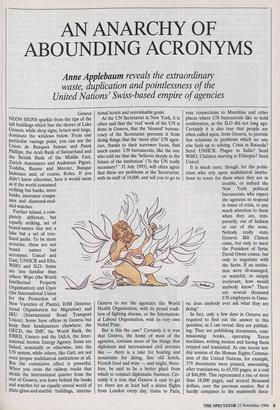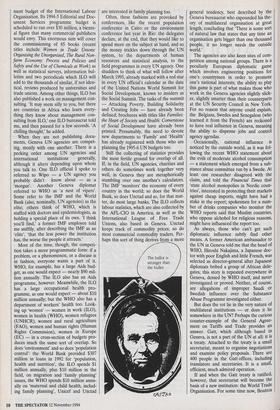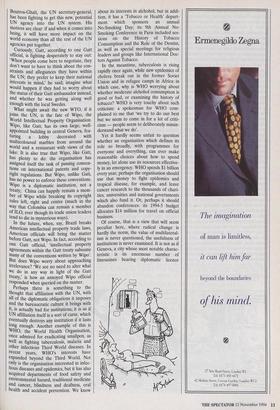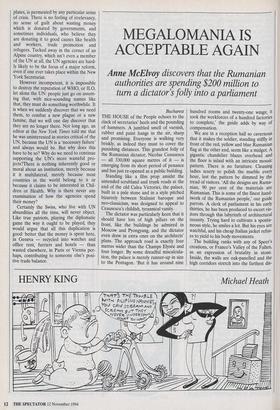AN ANARCHY OF ABOUNDING ACRONYMS
Anne Applebaum reveals the extraordinary
waste, duplication and pointlessness of the United Nations' Swiss-based empire of agencies
Geneva NEON SIGNS sparkle from the tips of the tall buildings which line the shores of Lake Geneva, while shop signs, letters writ large, dominate the windows below. From one particular vantage point, you can see the Union de Banques Suisses and Patek Phillipe, the Arab Bank of Switzerland and the British Bank of the Middle East, Zurich Assurances and Audemars Piguet, Toshiba, Baume and Mercier, Banque Indosuez and, of course, Rolex. If you didn't know otherwise, here it would seem as if the world contained nothing but banks, more banks, insurance compa- nies and diamond-stud- ded watches.
Further inland, a com- pletely different, but equally striking, set of brand-names line not a lake but a set of tree- lined parks. To be more accurate, these are not brand names but acronyms: Unicef and Gatt, UNHCR and Efta, WHO and ILO. Some are less familiar than others: Wipo (the World Intellectual Property Organisation) and Upov (the International Union for the Protection of New Varieties of Plants), IOM (Interna- tional Organisation for Migration) and IRU (International Road Transport Union). Some have offices in Geneva but keep their headquarters elsewhere: the OECD, the IMF, the World Bank, the EBRD, Unesco and the IAEA, the Inter- national Atomic Energy Agency. Some are linked, nominally or otherwise, into the UN system, while others, like Gatt, are not even proper multilateral institutions at all. But the cumulative effect is powerful. When you cross the railway tracks that divide the international quarter from the rest of Geneva, you leave behind the banks and watches for an equally unreal world of plate-glass-and-marble buildings, interna- tional hotels and unrealisable goals.
At the UN Secretariat in New York, it is often said that the 'real' work of the UN is done in Geneva, that the 'bloated' bureau- cracy of the Secretariat prevents it from doing things that the 'more elite' UN agen- cies, thanks to their narrower focus, find much easier. UN bureaucrats, like the one who told me that she 'believes deeply in the future of the institution' (Is the UN really necessary? ' 31 July 1993), will often agree that there are problems at the Secretariat, with its staff of 10,000, and tell you to go to Geneva to see the agencies: the World Health Organisation, with its proud tradi- tion of fighting disease, or the Internation- al Labour Organisation, with its very own Nobel Prize.
But is this the case? Certainly it is true that Geneva, the home of most of the agencies, contains more of the things that diplomats and international civil servants like — there is a lake for boating and mountains for skiing, fine old hotels, French food and wine — and might, there- fore, be said to be a better place from which to conduct diplomatic business. Cer- tainly it is true that Geneva is easy to get to: there are at least half a dozen flights from London every day, trains to Paris, easy connections to Mauritius and other places where UN bureaucrats like to hold conferences, as the ILO did not long ago. Certainly it is also true that people are often called upon, from Geneva, to provide fast solutions to problems which no one else feels up to solving. Crisis in Rwanda? Send UNHCR. Plague in India? 'Send WHO. Children starving in Ethiopia? Send Unicef.
In fact, only a few days in Geneva are required to find out the answer to this question, as I can reveal: they are publish- ing. They are publishing documents, com- missioning books, operating Xerox machines, writing memos and having them retyped and translated. At one recent ten- day session of the Human Rights Commis- sion of the United Nations, for example, 379 documents were printed, amounting, after translations, to 65,593 pages, at a cost of $46,898. This represented a rise of more than 18,000 pages, and several thousand dollars, over the previous session. But it hardly compares to the mammoth docu- ment budget of the International Labour Organisation. Its 1994-5 Editorial and Doc- ument Services programme budget is scheduled to run over $30 million, a bienni- al figure that many commercial publishers would envy. This enormous sum will cover the commissioning of 85 books (recent titles include Women in Trade Unions: Organising the Unorganised, The Rural Non- farm Economy: Process and Policies and Safety and the Use of Chemicals at Work) as well as statistical surveys, information bul- letins and two periodicals which ILO will add to the thousands of similar, if not iden- tical, reviews produced by universities and trade unions. Among other things, ILO has also published a work on management con- sulting. ‘It may seem silly to you, but there are countries in Africa who learn every- thing they know about management con- sulting from ILO,' one ILO bureaucrat told me, and then paused for a few seconds. 'A chilling thought,' he added.
When they are not publishing docu- ments, Geneva UN agencies are compet- ing, mostly with one another. There is a pecking order among UN agencies and international institutions generally, although it alters depending upon whom you talk to. One ILO official I spoke to referred to Wipo — a UN agency you probably didn't know about — as a `morgue'. Another Geneva diplomat referred to WHO as `a nest of vipers'. Some refer to the IMF and the World Bank (also, nominally, UN agencies) as the elite; others think of WHO, which is staffed with doctors and epidemiologists, as holding a special place of its own. 'I think you'll find,' a former IMF employee told me sniffily, after describing the IMF as an `elite', 'that the less power the institution has, the worse the people it attracts.'
Most of the time, though, the competi- tion takes a more programmatic form: if a problem, or a phenomenon, or a disease is in fashion, everyone wants a part of it. WHO, for example, has a large Aids bud- get, as one would expect — nearly $90 mil- lion annually. The ILO also has an Aids programme, however. Meanwhile, the ILO has a large occupational health pro- gramme, as one would expect — about $10 million annually; but the WHO also has a department of workers' health too. Look- ing up 'women' — women in work (ILO), women in health (WHO), women refugees (UNHCR), women and rural agriculture (FAO), women and human rights (Human Rights Commission), women in Europe (EC) — in a cross-section of budgets pro- duces much the same sort of overlap. So does 'environment' and so does 'population control': the World Bank provided $307 million in loans in 1992 for 'population, health and nutrition', the ILO spends $1 million annually, plus $10 million in the field, on migration and 'family planning' issues, the WHO spends $10 million annu- ally on 'maternal and child health, includ- ing family planning', Unicef and Unctad are interested in family planning too.
Often, these fashions are provoked by conferences, like the recent population conference in Cairo or the environment conference last year in Rio: the delegates declare, at the end, that they would like to spend more on the subject at hand, and so the money trickles down through the UN system, to the departments of human resources and statistical analysis, to the field programmes in every UN agency. One shudders to think of what will follow after March 1995, already marked with a red star in every UN official's calendar as the date of the United Nations World Summit for Social Development, known to insiders as the Social Summit. The tasks of the summit — Attacking Poverty, Building Solidarity and Creating Jobs — have already been defined; brochures with titles like Families: the Heart of Society and Health: Cornerstone of Social Development have already been printed. Presumably, the need to devote new departments to 'Family' and 'Health' has already registered with those who are planning the 1995-6 UN budgets too.
Still the collecting of statistics provides the most fertile ground for overlap of all. If, in the field, UN agencies, charities and others do sometimes work together very well, in Geneva they are metaphorically stumbling over one another's calculators. The IMF 'monitors' the economy of every country in the world; so does the World Bank, so does Unctad and so, for that mat- ter, do most large banks, The ILO collects labour statistics, which are also collected by the AFL-CIO in America, as well as the International League of Free Trade Unions, also based in Geneva. Unctad keeps track of commodity prices; so do most commercial commodity traders. Per- haps this sort of thing derives from a more general tendency, best described by the Geneva bureaucrat who expounded his the- ory of multilateral organisation at great length, concluding that 'There is some sort of natural law that states that any time an organisation gets bigger than one thousand people, it no longer needs the outside world.'
The agencies are also keen sites of com- petition among national groups. There is a peculiarly European diplomatic game which involves engineering positions for one's countrymen in order to promote one's national interests; the ability to play this game is part of what makes those who work in the Geneva agencies slightly slick- er, slightly smarter than their counterparts at the UN Security Council in New York. For no reason that anyone could explain, the Belgians, Swedes and Senegalese (who learned it from the French) are reckoned to have real influence in Geneva, meaning the ability to dispense jobs and control agency agendas.
Occasionally, national influence is noticed by the outside world, as it was fol- lowing the recent WHO statement about the evils of moderate alcohol consumption — a statement which emerged from a sub- stance abuse committee run by a Swede. At least one researcher disagreed with the claim, and told the Financial Times that `state alcohol monopolies in Nordic coun- tries', interested in protecting their markets against cheap imports, might have had a stake in the report; spokesmen for a num- ber of drinks companies who monitor the WHO reports said that Muslim countries, who oppose alchohol for religious reasons, might have influenced the report too.
As always, those who can't get such diplomatic influence subtly find other means. A former American ambassador to the UN in Geneva told me that the head of WHO, Hiroshi Nakajima, a Japanese doc- tor with poor English and little French, was selected as director-general after Japanese diplomats bribed a group of African dele- gates; this story is repeated everywhere in Geneva, denied by WHO itself, and never investigated or proved. Neither, of course, are allegations of improper Saudi or Swedish influence over the Substance Abuse Programme investigated either. But does the rot lie in the very nature of multilateral institutions — or does it lie somewhere in the UN? Perhaps the curious counter-example of the General Agree- ment on Tariffs and Trade provides an answer. Gatt, which although based in Geneva, is not a part of the UN at all: it is a treaty. Attached to the treaty is a small secretariat, meant to organise negotiations and examine policy proposals. There are 400 people in the Gatt offices, including translators and secretaries. It is a small, efficient, much admired operation. If and when the Gatt treaty is ratified, however, that secretariat will become the basis of a new institution: the World Trade Organisation. For some time now, Boutros Boutros-Ghali, the UN secretary-general, has been fighting to get this new, potential UN agency into the UN system. His motives are clear: if and when it comes into being, it will have more impact on the world economy than all the rest of the UN agencies put together. Curiously, Gatt, according to one Gatt official, is fighting desperately to stay out: When people come here to negotiate, they don't want to have to think about the con- straints and allegiances they have within the UN; they prefer to keep their national interests in mind,' he said; imagine what would happen if they had to worry about the status of their Gatt ambassador instead, and whether he was getting along well enough with the local Swedes.
What might await the new WTO, if it Joins the UN, is the fate of Wipo, the World Intellectual Property Organisation. Wipo, like Gatt, has its own large, well- appointed building in central Geneva, fea- turing a lobby decorated with multicoloured marbles from around the world and a restaurant with views of the lake. It is also true that Wipo, like Gatt, has plenty to do: the organisation has assigned itself the task of passing conven- tions on international patents and copy- right regulations. But Wipo, unlike Gatt, has no power to enforce these conventions. Wipo is a diplomatic institution, not a treaty; China can happily remain a mem- ber of Wipo while breaking its copyright rules left, right and centre (much in the way that Colombia can remain a member of ILO, ever though its trade union leaders tend to die in mysterious ways). In the future, when, say, Brazil breaks American intellectual property trade laws, American officials will bring the matter before Gatt, not Wipo. In fact, according to one Gatt official, 'intellectual property agreements within the Gatt treaty subsume many of the conventions written by Wipo'. But does Wipo worry about approaching irrelevance? 'We see no need to alter what we do in any way in light of the Gatt treaty,' is how an annoyed Wipo official responded when queried on the matter. Perhaps there is something to the thought that affiliation with the UN, with all of the diplomatic obligations it imposes and the bureaucratic culture it brings with it, is actually bad for institutions; it is as if UN affiliation itself is a sort of curse, which eventually destroys any institution if it lasts long enough. Another example of this is WHO, the World Health Organisation, once admired for eradicating smallpox, as Well as fighting tuberculosis, malaria and other infectious Third World diseases. In recent years, WHO's interests have expanded beyond the Third World. Not only is the organisation interested in infec- tious diseases and epidemics, but it has also acquired departments of food safety and environmental hazard, traditional medicine and cancer, blindness and deafness, oral health and accident prevention. We know about its interests in alchohol, but in addi- tion, it has a 'Tobacco or Health' depart- ment which sponsors an annual No-Smoking Day; its 9th Annual No- Smoking Conference in Paris included ses- sions on the History of Tobacco Consumption and the Role of the Dentist, as well as special meetings for religious leaders and groups like International Doc- tors Against Tobacco.
In the meantime, tuberculosis is rising rapidly once again, while new epidemics of cholera break out in the former Soviet Union and in refugee camps in Africa: in which case, why is WHO worrying about whether moderate alchohol consumption is good or bad, or examining the history of tobacco? WHO is very touchy about such criticism: a spokesman for WHO com- plained to me that 'we try to do our best but we seem to come in for a lot of criti- cism — people seem to deliberately misun- derstand what we do'.
Yet it hardly seems unfair to question whether an organisation which defines its role so broadly, with programmes for everyone and everything, can ever make reasonable choices about how to spend money, let alone use its resources effective- ly in an emergency. WHO spends $1 billion every year; perhaps the organisation should use that money to fight epidemics and tropical disease, for example, and leave cancer research to the thousands of chari- ties, universities and national governments which also fund it. Or, perhaps it should abandon conferences: its 1994-5 budget allocates $14 million for travel on official business.
Of course, that is a view that will seem peculiar here, where radical change is hardly the norm, the value of multilateral- ism is never questioned, the usefulness of institutions is never examined. It is not as if Geneva, a city whose most notable charac- teristic is its enormous number of limousines bearing diplomatic licence plates, is permeated by any particular sense of crisis. There is no feeling of irrelevancy, no sense of guilt about wasting money which is donated by governments, and sometimes individuals, who believe they are donating it to good causes like health and workers, trade promotion and refugees. Tucked away in the corner of an Alpine country, which isn't even a member of the UN at all, the UN agencies are hard- ly likely to be the focus of a major reform, even if one ever takes place within the New York Secretariat.
However incompetent, it is impossible to destroy the reputation of WHO, or ILO, let alone the UN: people just go on assum- ing that, with nice-sounding names like that, they must do something worthwhile. It is when we suddenly discover that we need them, to combat a new plague or a new famine, that we will one day discover that they are no longer there. Not long ago, an editor at the New York Times told me that he was uninterested in stories critical of the UN, because the UN is a 'necessary failure' and always would be. But why does this have to be so? Why do we need to continue supporting the UN's more wasteful pro- jects?There is nothing inherently good or moral about an institution, merely because it it multilateral, merely because most countries in the world belong to it or because it claims to be interested in Chil- dren or Health. Why is there never any examination of how the agencies spend their money?
Certainly the Swiss, who live with UN absurdities all the time, will never object. Like true patriots, playing the diplomatic game the way it ought to be played, they would argue that all this duplication is good: better that the money is spent here, in Geneva — recycled into watches and office rent, furriers and hotels — than wasted elsewhere, in Paris or Vienna per- haps, contributing to someone else's posi- tive trade balance.





































































 Previous page
Previous page